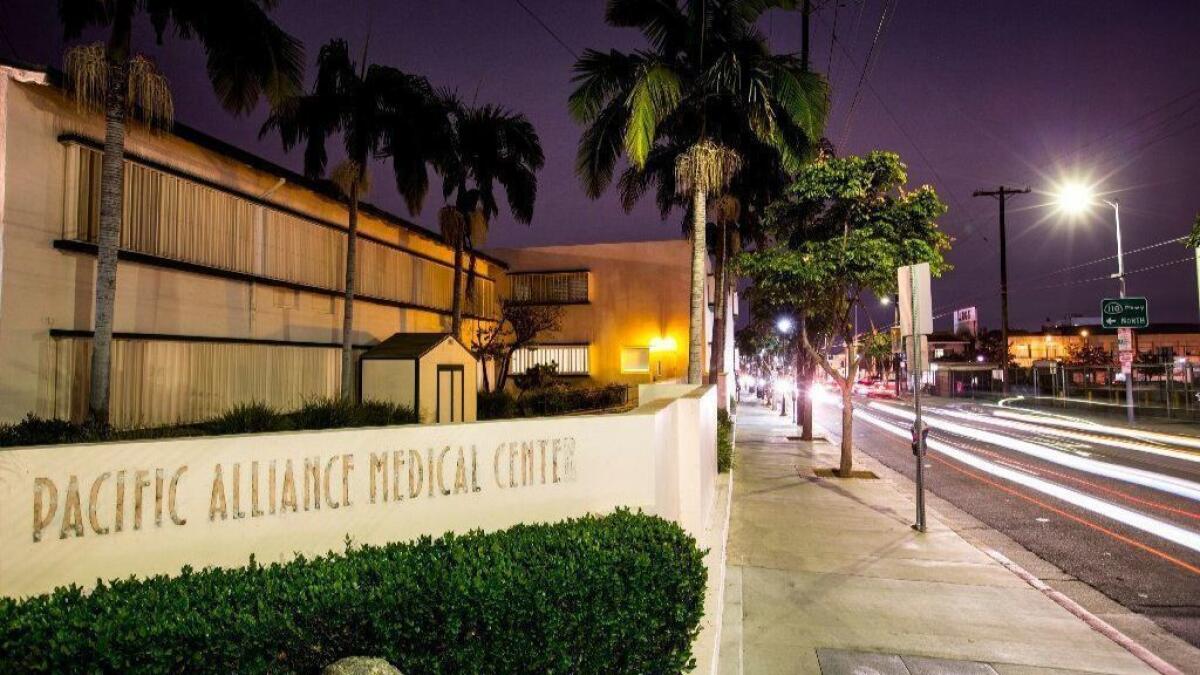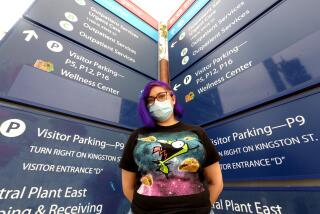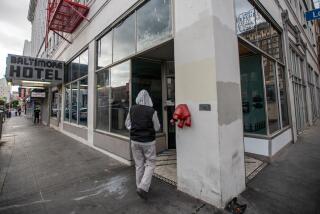Chinatown’s only hospital will reopen as an outpatient clinic

- Share via
An outpatient clinic will replace the shuttered Pacific Alliance Medical Center in Chinatown, marking the second time a group led by Chinese doctors has rescued the historic hospital property from closure.
Allied Pacific, AHMC Healthcare and Network Medical Management partnered to buy the property for $33 million in a sale that closed last week, according to a release from CBRE, the real estate company representing the property’s owners, the French Society.
In Chinatown, the news was met with relief. More than 2,000 elderly Asian Americans live in Chinatown, and many of them relied on the nearby hospital for medical care.
“It is important to have a 24-hour urgent care center,” said King Cheung, a Chinatown resident and activist. “Also, it is wonderful that the property won’t turn into a high-end mixed-use housing complex.”
The new ownership group plans to build an outpatient facility with an urgent care, a surgery center, a radiology department, a lab, and rooms for multiple medical specialties, said Allied Pacific Chairman Kenneth Sim. If they can obtain the requisite licenses, they hope to offer services again at the facility within three to six months, Sim added.
The medical facility, which was established as the French Hospital, is one of the city’s oldest hospitals. It was built to serve the French population in 1860 during a smallpox scare.
The area around the facility would later become Chinatown, and the hospital became an important part of the Chinese community. The cafeteria served congee and snow peas, and the staff offered services and classes in not just Mandarin, but also the multiple southern Chinese dialects that are commonly spoken in Chinatown.
By 1989, 55% of the hospital’s clients were Asian. That year, a group of Chinatown businessmen and doctors, as well as a Japanese entrepreneur, stepped in to rescue the facility from bankruptcy and renamed it the Pacific Alliance Medical Center.
In recent years, the hospital posted large operating losses and was forced to pay $42 million to settle a federal lawsuit that alleged that the hospital was forming illegal partnerships with doctors in exchange for patient referrals. The hospital closed in December, facing a state-mandated seismic renovation estimated to cost nearly $100 million.
News of the closure had caused alarm among Chinatown’s elderly residents, many of whom didn’t know that the hospital was closing until it was too late. The closing also prompted about a dozen medical practitioners in the surrounding neighborhood to close operations.
Councilman Gil Cedillo’s office, as well as a group of community activists, helped generate support for the new bid, Sim said.
Renovations for the new outpatient facility should be ready before the end of the year.
“We don’t know if it will pan out or not, we have no definitive financial models, but we know at least one thing, which is that this is something we can afford today,” Sim said.
The new ownership group is also studying the cost of rebuilding the facility in time to meet state seismic retrofitting requirements in 2020 and restoring the facility to an acute-care hospital.
Many of the doctors in the new ownership group have served patients in Chinatown. Others have parents or older relatives who relied on the hospital for care, including Sim’s grandmother.
“Chinatown is extremely important to many of us,” Sim said. “We felt obligated in some way to give something back.”
Twitter: @frankshyong
More to Read
Sign up for Essential California
The most important California stories and recommendations in your inbox every morning.
You may occasionally receive promotional content from the Los Angeles Times.














